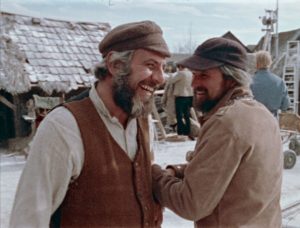STUDIO: Zeitgeist | DIRECTOR: Daniel Raim
THEATRICAL RELEASE DATE: April 29, 2022
SPECS: NR | 88 min. | Documentary
RATINGS (out of 5 dishes): Movie
Nearly 60 years after its theatrical premiere and 50 years following the release of its 1971 film adaptation, the musical Fiddler on the Roof remains as beloved, fresh and vital as it did when it first opened at Broadway’s Imperial Theater in New York City in 1964.
Fiddler’s Journey to the Big Screen, directed by Daniel Raim (Harold and Lillian: A Hollywood Love Story), focuses on the film version of the landmark show, which won a Tony Award for Best Musical and eight other Tonys back in ’65.
Fiddler on the Roof is based on the story Tevye and his Daughters and other tales by Sholom Aleichem, the central figure of early 20th century Yiddish literature. It tells of the lives of the poor dairyman Tevye and his family in the village of Anatevka in the Western region of the Imperial Russian Empire circa 1905.
Norman Jewison, director of the 1971 film version of Fiddler on the Roof (which he deems a “spiritual and creative quest”), leads the charge of interviewees and vintage footage and stills in this insightful and very entertaining doc, which is narrated by Jeff Goldblum. The non-Jewish Canadian-born filmmaker Jewison got his start helming live television in the Fifties and Doris Day movies in the early Sixties, before moving on to such substantial films as the Oscar-winning In the Heat of the Night (1967) and The Thomas Crown Affair (1968). Regarding Fiddler, he only has positive memories of the production, which was largely shot outside the city of Zagreb in the former Yugoslavia production and at London’s Pinewood Studios.

Director Norman Jewison (r.) and actor Topol on the set of 1971’s Fiddler on the Roof as seen in Fiddler’s Journey to the Big Screen
Jewison’s pleasant remembrances are seconded by other recent interviews with Israeli-born actor Topol, who portrayed Tevye, and actresses Rosalind Harris, Michele Marsh and Neva Small, who played his daughters. Harris has the most vivid recollections of the group, particularly as she recounts Jewison’s reaction to the time she and her celluloid sisters decided to “go Method” and groom themselves like early 20th century Russian women. (“Go shave those pits right now!” was Jewison’s bellowing on-set reaction.)
Other insightful commentary on the show’s origin and film’s production is offered by lyricist by Sheldon Harnick, who was one-third of Fiddler‘s creative triumvirate along with the composer Jerry Bock and book writer Joseph Stein. (Of the three, Harnick is still alive and kicking at 97.)
Fiddler on the Roof was a box office hit and nominated for eight Academy Awards, including Best Picture, Best Director for Jewison, Best Actor for Topol, and Best Music and Scoring Adaptation for John Williams, who won the award and is also on board to comment on his work on the film.
Jewison would be awarded an Oscar years later (an Irving G. Thalberg Memorial Award in 1999) but based on what he says here, Fiddler‘s production appears to have been an even more rewarding experience for him.
His best story: As Jewison has recounted many times over the years, in 1970, he was summoned to a meeting with United Artists studio chief Arthur Krim, who asked him if he would direct the film version of Fiddler on the Roof.
Jewison took a breath and responded, “What would you say if I told you I was a goy?”
After a moment’s hesitation, Krim told him that the offer was still good.
The punchline to that infamous exchange is that the not-quite-Jewish Jewison went on to further prove his diversity with his very next film project: 1973’s Jesus Christ Superstar.
Fiddler’s Journey to the Big Screen opens at New York City’s Angelika Theater on Friday, April 29 while also rolling out to theaters and Jewish film festivals across the country.
Leave a Reply